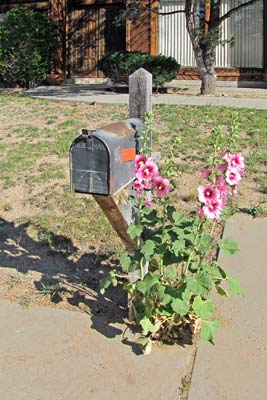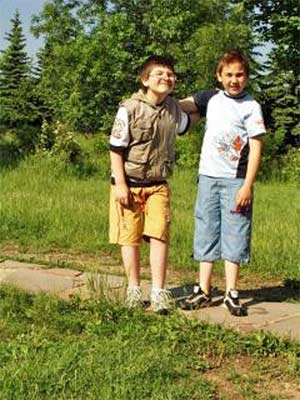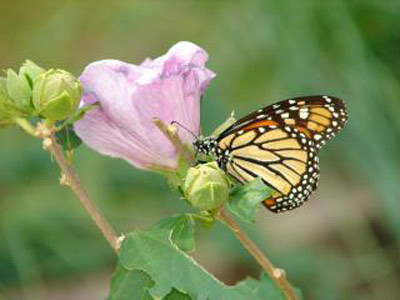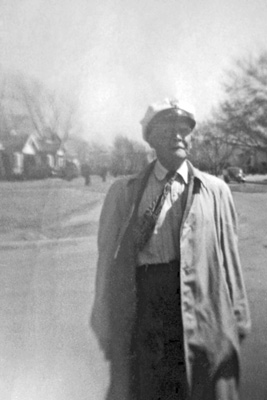IT’S AN HONOR TO HELP A CHILD
By Mary Hunt Webb
Posted Sunday, June 5, 2011

Surprises still arrive in mailboxes. [Photographer: Mary Hunt Webb]
I was packing my suitcase to attend a writer’s conference out of town when a large envelope arrived in the mail. The return address was that of an aunt in a Midwestern state.
In a note, my aunt explained that the enclosed material was part of a project that a teacher on the east coast had assigned to her students. Each student had written an introduction describing him/herself and had included it with a self-drawn portrait of what s/he looked like. Attached to the material was a request to send the material west. It also contained a tracking sheet to record where the envelope had been, the names of the people that had received it, and when they had mailed it. When the envelope reached the west coast, the recipient was to mail it back to the teacher on the east coast. The purpose of the project was to teach the students geography through tracking the routes of their material.
As I opened the material, the introduction announced, “Hello, I am Flat Nelson. I am 9 years old. I live in South Carolina. Please help me travel to the west coast.” Young Nelson wrote that he hoped that his envelope, “Flat Nelson”, would be the first to return to South Carolina. Apparently, his teacher was satisfied for the envelopes to remain within the forty-eight contiguous states and did not require the inclusion of Alaska or Hawaii.
My aunt had received the envelope from someone else and sent it to me because I probably live farther west than any other family members that she knows. She did not know that I intended to travel immediately.
The postmark on the original envelope showed that “Flat Nelson” had been gone from South Carolina less than a week. I hurriedly added “Flat Nelson” to my briefcase and continued packing.
When I arrived at the conference, one of the writers I met was from California. The second time we chatted, I told her about “Flat Nelson”. I asked if she would be willing to take the envelope back with her to California and mail it to South Carolina in order to help a little boy with his school project.
“Oh, no!” she replied indignantly. “I’m too busy! I’m going from here to a speaking engagement! I won’t have time for that!”
I was stunned! Mailing an envelope wouldn’t take more than a few minutes! She could have used the hotel stationery to send it on.
Deflated, I continued meeting and talking to people from all over the United States. Among them was a writer who was also the mother of four children. My heart soared when I discovered that she lived in California. After the previous rejection to my request, I approached this lady cautiously. Once again, I explained young Nelson’s project.
Hesitantly, I asked, “Would you be willing to take ‘Flat Nelson’ back with you to California and mail it to his teacher in South Carolina?”
“Oh,” she replied with a smile and a twinkle in her eye, “I’d be honored to be part of a little boy’s life!”
Her response surprised me, and I said so.

Children eagerly receive attention from those who are willing to give it. [Photo courtesy of Stockvault.net]
“Mary, people have done so much to help my children that I’m happy to help another child learn.”
The difference between the responses from the two California residents still amazes me today. The first considered my request to be an inconvenience while the second regarded it as an honor. Her use of the word honor still echoes in my memory.
Sadly, the occasion to interact with children is denied to some. However, the first woman willingly missed participating in Nelson’s young life, even from a distance. The second woman seized the opportunity joyfully. Although neither she nor I ever met the real Nelson, it was an honor to be part of his vicarious journey across the United States.

Children, flowers, and butterflies are temporary. [Photo courtesy of Stockvault.net]
Like flowers and butterflies, children don’t last. They disappear before we know it into the world of adults. If we act quickly, we can interact with them. If we are slow, we miss them.
I remember my own grandfather, Robert J. Burdette, Jr., and his selfless gift of time to young people in his later years. Although he had met some of the most famous people of his day while he was still a child, including Mark Twain and James Whitcomb Riley, he became a school crossing guard and a park policeman toward the end of his life, rather than resting on his laurels. During the summer, when school was out, he volunteered as crossing guard during Vacation Bible School at a church near our home. He knew that children don’t last, and he didn’t want to miss them.

Robert J. Burdette, Jr., affectionately known as “Pop Burdette”, was a familiar sight to young people and to police officers in his neighborhood. [Photographer: Lorene Pierce]
When “Pop Burdette” lay ill in his last days, teenagers and young people climbed the steps to our second floor dwelling to visit the man who had given so generously of his time and dwindling energy.
As we enter a new season, you may have the opportunity to assist a child, work in a school, direct children across busy streets, volunteer in Vacation Bible School, or give a mother an afternoon off by taking her children to a park or swimming pool. If your health, your schedule, your strength, and your back allow you to participate, please do so, remembering the words of Jesus in Matthew 18:5 “Whoever receives one little child like this in My name receives Me.” (New King James Version)
![Mary Hunt Webb reads to the Jaime [pronounced, Hy’-may] children.](images/20110605/Image20110605-5.jpg)
Sarah, Rebecca, and Jacob Jaime listen intently as Mary Hunt Webb reads a story to them. [Photographer: Morris Webb]

